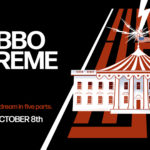
So Tim Robbins and Donald Trump walk into a bar.
Not together.
They just happened to be in the same Greenwich Village club one night in the mid-1990s. But given the fact that fame is an irresistible magnet for Mr. Trump, the two men naturally ended up in a picture.
“I was throwing a private party for a friend, and he tried to crash it and I wouldn’t let him,” Mr. Robbins recalls. But Mr. Trump is not that easily put off, even when his quarry has disdain for him.
“We were in a little roped-off section of the club that I had rented out and I was leaving to go to the bathroom and all of the sudden, there he is. And before I know it, I turn around and there’s photo flashes, and it was weird. He wanted a photo with me because I was famous. He used to do that a lot, by the way. He wanted to be photographed with famous people all the time.”
It is strange that this onetime cardboard-cutout celebrity popping up at Gotham parties has turned into a psychic dentist drill, boring into Americans’ deepest, most painful schisms on race, gender and inequality.
“Think about this,” Mr. Robbins says, over scallops, fries and espresso in the bar at the Crosby Street Hotel in SoHo. “You pursue celebrities your entire life when you’re a real-estate developer, and then you become the most powerful person in the country and no one wants to be photographed with you. This is the time when most celebrities will go to your side, and no one is going to his.”
The Washington traditions that you’d think President Trump would have enjoyed, given his old party-surfing, glitterati-fawning ways — like the White House Correspondents Dinner and the Kennedy Center Honors — he has shunned.
“He doesn’t want to be in a situation where anyone has any kind of power over him,” Mr. Robbins theorizes. “And celebrities ultimately have the power to say, ‘No, I don’t want to be photographed with him.’” Like Tom Hanks saying he wouldn’t go to the White House to screen “The Post,” even if he were asked, or Tom Brady deflating President Trump and refusing to go to the Super Bowl ceremony at White House, no doubt because he feared the wrath of Gisele.
“He’s that guy at work that you used to ignore, you know?” Mr. Robbins says of the president. “It’s like, ‘Oh, God, he’s at it again. Just leave him alone. Ignore him.’ And then he’s all upset he wasn’t invited to the party. ‘No, you’re an ass. You don’t get invited to the party. I’m sorry.’”
I muse that it must be uncomfortable to follow the first African-American president, known for his grace and exemplary family life, into the White House and then have to spend all your time denying that you’re a racist or that you assaulted a string of women and paid off a porn star (whose interview with In Touch contained the startling revelation that the country’s most famous germophobe didn’t wear a condom.)

“‘Bob Roberts’ came true,” Mr. Robbins says, referring to the 1992 mockumentary he wrote and starred in.
He prefigured the Trump phenomenon in the film, which is about a charismatic television entertainer and rich businessman who runs for office on the Republican ticket, sugarcoating his corrupt ways with an appeal to family values. He is hailed as a savior by his fans and as a crypto-fascist by his critics.
When a young woman sends an admiring note to Bob Roberts, he writes back warning her to stay away from crack because “It’s a ghetto drug.”
As Vincent Canby said in his New York Times review, “Bob understands the appeal of an ultraconservative political and economic policy even to those who have nothing: anticipating the day when they do have it all, they want to make sure they will be able to keep it.” Bob urges his followers to “take, make and win by any means” and asks them: “Why has your American dream been relegated to the trash heap of history?”
When the movie was a big hit in Cannes, Miramax signed on as a co-distributor and Harvey Weinstein began hectoring Mr. Robbins to recut and re-edit the film.
“He must have called me 20 times and I just told him, ‘No, I’m not doing it,”’ Mr. Robbins says. “He was so powerful because he had a company that was making movies that the studios weren’t making.”
Aside from his monstrous behavior with women, Mr. Weinstein ravaged Hollywood in other ways, Mr. Robbins posits, adding that, though the producer was hailed for his good taste, “you could make the argument that Harvey’s overall impact on cinema was negative.
“What happened is, when Miramax became as successful as it became, every studio all of a sudden wanted to have an independent arm,” he says. “So they all set up their little boutique companies that would do ‘independent’ films, quote unquote. And it wasn’t that they were independent or edgy or that the content was risky or provocative. It was more that it was independent of paying people what the studios had to pay them. And so it became this way of making films on the cheap and not committing full studio resources into those kinds of films.”
When Mr. Weinstein asked Mr. Robbins to star in an indie called “Smoke,” shortly after the producer had sold Miramax to Disney for some $60 million in 1993, the actor remembers confronting him, saying: “‘Harvey, the talent made your company and you’ve been paying them scale for years. And you just put a fortune in your pocket. When are we going to see some of that?’”
He said that Mr. Weinstein called back an hour later to say that he would pay Mr. Robbins a million dollars to do the part but ordered him not to tell the other actors, who would still get scale.

“‘You don’t get what I was saying,’” Mr. Robbins recalls telling him. “This wasn’t a shakedown for me to get money. This was about, What are you going to do overall for talented people now that you’ve been monetized in this way?”
Mr. Robbins deadpans: “Needless to say, I never worked for him again after that conversation. Also, he was personally transforming the Oscars into an advertising campaign that was about a relentless pursuit of gold.”
Mr. Robbins, who loves old Hollywood, is rueful about the dearth of great movies: a decay in Hollywood standards that gave Mr. Weinstein power, and cover, for a long time.
“Since I won the Oscar for ‘Mystic River’ in 2004, I think I’ve worked in one studio film as a lead actor, which was ‘Catch a Fire’ at Universal,” Mr. Robbins says. “But I don’t know why that is. The way I look at it is, every movie I have done, I am proud of, other than one I did for money, ‘Green Lantern.’ Is it ‘Green Lantern’ or ‘Green Arrow’? I forget. I do have to pay the bills occasionally. But I’m not broke. I have been wise with my money. I don’t need to be an über-rich person. I’m happy where I am.”
He agrees with the philosophy of the San Antonio Spurs coach Gregg Popovich, who explained recently why charitable contributions matter: “Because we’re rich as hell, and we don’t need it all, and other people need it.” And you’re a jerk if you don’t give it.
Asked about the tectonic shift for women in Hollywood, Mr. Robbins says he is happy that “the incredibly libidinous atmosphere in Hollywood is changing” so that men will be more afraid “to intimidate women into compliance in horrible, rapey ways.”
“Everybody knew,” he says in a disgusted whisper about Harvey Weinstein. “Everybody knew.”
He thinks there might actually be a fundamental shift, “not just on the man-woman thing but the male-male thing, too. That’s been happening for a long time.”
He knows this is a supercharged moment, given the opprobrium that has descended on stars such as Matt Damon, who said people should acknowledge “a spectrum” of bad behavior among men.
“It’s really, really important that women have the floor now to talk about this because it has been so pervasive throughout every industry as long as I’ve been alive,” Mr. Robbins says. But, he adds, “I don’t trust mobs of any kind, even when they’re advocating for things I support. People losing their careers based on innuendo or accusation is troubling for me. There is a process for this: a legal system. Convicting someone on an accusation is really dangerous territory to be living in.”
He worries about overreach. “Is it possible for me to do a feminist film or a film about race and speak with any authority, or am I limited to telling stories about white men?”

Mr. Robbins is passionate about politics but protests that he is not a radical.
He does cop to driving in Santa Monica many years ago with his older son, Jack, when he was about 12, and when Mr. Robbins saw Henry Kissinger coming out of the posh Ivy at the Shore restaurant, he leaned out and yelled, “War criminal!”
“And my son was like, ‘What? What? Why are you doing that?’”
He does not regret speaking out against our misguided wars, even though, during the Iraq fiasco, he got denounced by conservatives as a “terrorist supporter” and a “Saddam lover.”
“My children were young when 9/11 happened, and that was a traumatic experience,” he says. “And they saw how a traumatic experience was turned into using manipulated information to produce another catastrophe, which was the war. So it’s kind of a double trauma. And I don’t think they trust the institutions of power and so they’re looking to create their own. Many of our leaders are no longer on moral high ground. The millennials are living in a society where if you fail you succeed, from the bankers who almost brought down the economy and then got bonuses to Trump and his bankruptcies. It started with Nixon. The degradation of it all. Wouldn’t we be living in a different country right now if Richard Nixon went to jail?”
He laughs, noting wryly that “the millennial midlife crisis will be one for the ages.”
He avidly supported Bernie Sanders in the primary before switching to Hillary Clinton in the general. (His ex Susan Sarandon, also an independent spirit, got heckled by Hillary supporters for refusing to support Mrs. Clinton; she said, “I don’t vote with my vagina,” and then switched to Jill Stein after Mr. Sanders was out.)
“I think the Democratic Party is making a huge mistake right now, trying to caustically marginalize those people that voted for Bernie, because they’re not going to be shamed,” Mr. Robbins says.
When he started his career, Mr. Robbins got offered a lot of roles as psycho killers. Then came “The Player.” Now, at 59, he says that “most of the parts I get offered are middle-aged dudes having existential crises.”
He’s depicting another in Alan Ball’s new HBO series, “Here and Now,” which has its premiere on Feb. 11. Mr. Robbins’s character is a depressed philosophy professor named Greg Boatwright who plays Candy Crush and cheats on his wife, played by Holly Hunter, with a young hooker. In addition to their biological daughter, the couple, who met at Berkeley, has the “great experiment” of three adopted children (black, Asian and Hispanic), now grown.
The show centers on the dynamics of having this pocket of progressivism in Portland, Ore., when white supremacy groups are lurking right outside of town. Mr. Robbins’s gloomy character sees “ignorance, hatred, terror and rage” winning, which makes his wife yearn to “smack him in the face with a big, wet fish.”
Mr. Robbins has also been working on a memoir about growing up in a one-bedroom railroad apartment with a dog, two cats, a rabbit and his folk singing family — his father, Gil, was a guitarist and songwriter with the Highwaymen — and meeting a lot of “crazy creative geniuses” in Greenwich Village. (Mr. Robbins lived nearby in Chelsea during his long relationship with Ms. Sarandon.)
“My dad’s way of dealing with his depression was to build something, a harpsichord or cabinets or a loom,” he says. “I still have some of the things from his weaving period.”

Mr. Robbins says he is “super-proud” of his children. Ms. Sarandon’s daughter with Franco Amurri, Eva — Mr. Robbins refers to Eva as his daughter — has two children and writes a parenting blog called “Happily Eva After.”
Mr. Robbins has been producing short films for his oldest son, Jack, who got into Sundance last year and this year. And his younger son, Miles, is going on tour with his band and has roles in the upcoming “X Files” and “Halloween” movies.
Perhaps because he got used to wearing the garter belt of Ms. Sarandon’s character in “Bull Durham,” Mr. Robbins was not bothered by Miles’s op-ed in HuffPost talking about how, even though he is “mostly heterosexual” — he has kissed a few men — he likes to wear dresses on stage sometimes or to parties.
“He’s a showman,” said his father, adding that he himself wouldn’t do it because “You’ve got to have nice legs for that.”
He is still very private about his two-decade romance with Ms. Sarandon, noting that accounts of stars’ personal lives are inevitably “artificial or manufactured because when you’re promoting a movie, you’re trying to tell people what they want to hear. And they’re operating in stereotypes from the past — younger man, older woman, whatever it is — different perceptions that have nothing to do with reality.”
After dating for years, he says, “I’m with someone right now that I’ve been with for a while. I like my life right now.”
He lives in Venice, Calif., in a charming house, where he has fun art parties and writes poetry and music and plays and screenplays. (His latest, “The Heretic,” is about a trio of Jesuses, one of whom gets waterboarded because his message of love is too radical for Christian consumption.)
He is still busy with the Actors’ Gang, which he founded in 1981. Through the Actors’ Gang Prison Project, Mr. Robbins, who starred in “The Shawshank Redemption,” has had some success over the last decade in renewing interest and funding for arts programs in California prisons, which he believes can help change the behavior of criminals and teach social skills. Former Attorney General Eric Holder was a strong supporter, given the soaring incarceration rates, and Mr. Robbins says his prison plays, mingling black gang members and white supremacists, should be a bipartisan project. He says he would meet with Jeff Sessions, if Mr. Sessions were willing. He’s doing a documentary on the project.
The latest production of the Actors’ Gang, “The New Colossus,” opens on Feb. 8, with 12 actors from 12 different parts of the world reminiscing about or playing their ancestors in their journeys from oppression to freedom.
“All of our ancestors are related in a common desire,” Mr. Robbins says. “The tribalism, dividing us by race, is not who we are. It’s being manipulated for an economic cause. One night we had people from all over the world in our little hundred-seat theater and I was like, ‘This is America right here in this room.’ And it was so powerful. The division that’s happening now is all an illusion.”
MORE: Tim Robbins names his celebrity doppelgänger in a round of Confirm or Deny.
An earlier version of this article appended an unnecessary correction. The original article referred correctly to Miramax’s sale to Disney for some $60 million in 1993, not Disney’s sale of Miramax to Filmyard Holdings in 2010 for $663 million.


